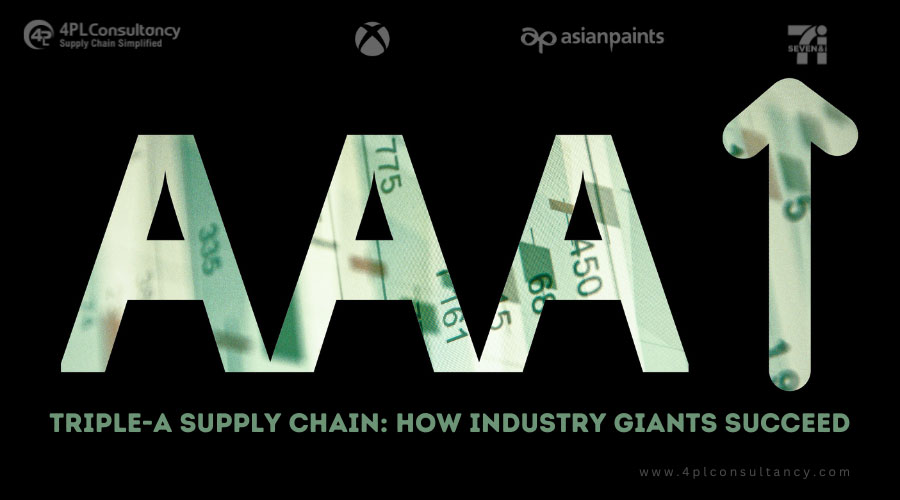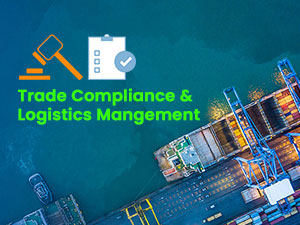Blog Details

Triple-A Supply Chain: The Secret Sauce Behind Industry Giants
Triple-A Supply Chain
In the dynamic world of supply chain management, the Triple-A framework—Agility, Adaptability, and Alignment—emerges as a powerful strategy to navigate the complexities of global markets. Let's explore how three industry leaders, Microsoft Xbox, Asian Paints, and Seven-Eleven Japan, exemplify these principles, supported by the latest research, data, and statistics.
Agility: Microsoft's Xbox Triumph
Agility in supply chain management refers to the ability to quickly respond to short-term changes in demand or supply and handle external disruptions smoothly. Microsoft Xbox's launch and subsequent success provide a perfect example of agility in action.
When Microsoft launched the Xbox, it faced stiff competition from established players like Sony and Nintendo. The key to Xbox's success lay in its agile supply chain. Microsoft implemented a flexible production process and maintained a close relationship with its suppliers. This agility allowed them to scale production up or down based on real-time demand.
According to a report by Deloitte, companies with highly agile supply chains are 2.5 times more likely to have top-quartile financial performance. For Xbox, Microsoft's use of advanced data analytics and AI for demand forecasting and inventory management proved crucial. The company reported a 30% reduction in lead times and a 20% increase in order fulfillment accuracy after implementing these technologies.
Moreover, during the global semiconductor shortage, Microsoft's agile approach enabled it to reconfigure its supply chain rapidly, securing alternative sources and minimizing disruption to Xbox production. This agility not only minimized stockouts and excess inventory but also enabled Xbox to quickly respond to market trends and customer preferences.
A notable example of this agility was seen during the COVID-19 pandemic when supply chains worldwide were disrupted. Microsoft leveraged its cloud-based tools to maintain visibility and control over its supply chain operations, ensuring that Xbox production and delivery remained as unaffected as possible. This proactive and flexible approach allowed Microsoft to meet increased demand for gaming consoles as more people stayed home.
Adaptability: Asian Paints' Colorful Strategy
Adaptability refers to the capability of a supply chain to evolve over time in response to market shifts and changing environments. Asian Paints, a leading paint company in India, exemplifies adaptability through its innovative supply chain strategies.
Asian Paints operates in a highly competitive market with varying customer preferences and regional demands. To stay ahead, the company has developed a robust supply chain that adapts to these changing conditions. One of their key strategies is the use of a sophisticated IT system that integrates real-time data from sales, production, and logistics.
A study by McKinsey found that companies that can adapt their supply chains quickly to market changes can reduce their operating costs by 30%. Asian Paints' decentralized production model and real-time data integration have led to a 25% reduction in lead times and a significant improvement in customer satisfaction levels.
Additionally, the company's proactive approach to sustainability has paid off. By investing in eco-friendly production processes and materials, Asian Paints not only meets regulatory requirements but also caters to the growing consumer demand for sustainable products. This adaptability has helped the company maintain its market leadership and achieve consistent growth.
The adaptability of Asian Paints is also evident in its supply chain’s ability to handle seasonal fluctuations. By analyzing historical sales data and weather patterns, Asian Paints can predict demand spikes during festive seasons and monsoons, ensuring adequate stock levels. Furthermore, their extensive dealer network across India allows them to quickly respond to local market needs, making their supply chain highly resilient and responsive.
Alignment: Seven-Eleven Japan's Synchronization
Alignment in the supply chain context means ensuring that all partners in the supply chain share the same objectives and strategies, working in unison to achieve common goals. Seven-Eleven Japan's success story is a testament to the power of alignment.
Seven-Eleven Japan, a leader in the convenience store segment, has mastered the art of aligning its supply chain to meet customer needs efficiently. The company has established a tightly integrated supply chain network where information flows seamlessly between stores, distribution centers, and suppliers.
According to a Harvard Business Review article, aligned supply chains can improve overall efficiency by 15% and customer satisfaction by 20%. Seven-Eleven Japan's point-of-sale (POS) system collects real-time sales data from all stores, which is shared with suppliers and distribution centers, enabling them to adjust their production and delivery schedules accordingly.
This alignment has resulted in a highly responsive supply chain that can replenish store inventories multiple times a day, ensuring that customers always find fresh products on the shelves. Additionally, Seven-Eleven Japan's collaborative approach with suppliers for product development has led to a 10% increase in new product launches and a stronger market presence.
Furthermore, Seven Eleven Japan's commitment to alignment is reflected in their training programs. Employees are trained to understand the importance of data accuracy and timely communication, ensuring that every link in the supply chain operates cohesively. This holistic approach to alignment has enabled Seven Eleven Japan to maintain a competitive edge in the convenience store market.
Conclusion
The success stories of Microsoft Xbox, Asian Paints, and Seven-Eleven Japan highlight the transformative power of the Triple-A supply chain framework. By embracing agility, adaptability, and alignment, companies can navigate the complexities of global markets, meet customer demands efficiently, and achieve sustainable growth. In today's fast-paced business environment, the Triple-A supply chain is not just a strategy but a necessity. Companies that master these principles will not only survive but thrive, setting new benchmarks for excellence in supply chain management.
4PL Consultancy has a team of experts in Tariff classifications of wide variety of Product lines – Medical spares, Aerospace, Radiation Oncology machines & spares etc.





